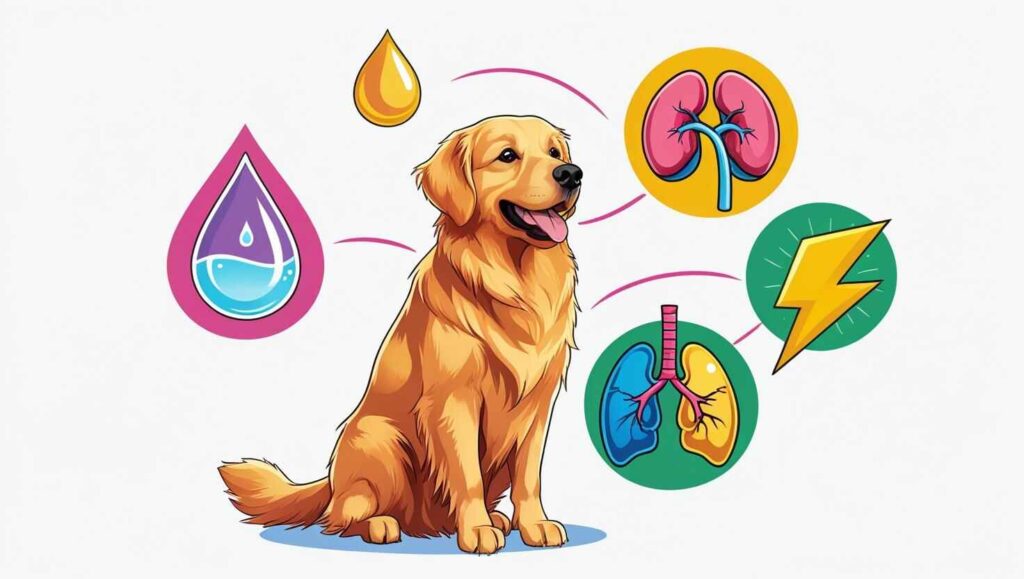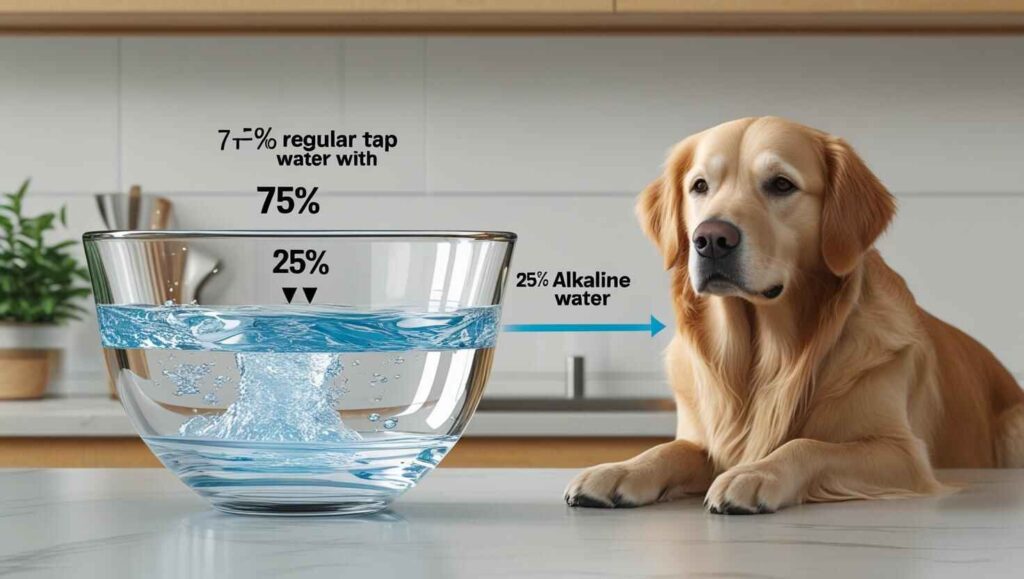What is Alkaline Water?
Alkaline water is simply water that has a higher pH level than standard tap water—usually ranging between 8 and 9, while regular water sits at a neutral pH of 7. It often contains beneficial minerals such as calcium, magnesium, and potassium, which give it its unique properties. Many health-conscious people drink it to balance their body’s acidity and aid hydration.
But when it comes to our furry friends, the question arises—can dogs drink alkaline water safely?
How Does Alkaline Water Affect Dogs?
Dogs, like humans, have a natural pH balance that keeps their internal systems working properly. Most dogs have a blood pH level around 7.35–7.45, which is already slightly alkaline. Adding more alkalinity through water can either help or disrupt that delicate balance depending on several factors.
Dogs’ Natural pH Balance
Your dog’s body naturally maintains a slightly alkaline environment, which plays a key role in supporting healthy digestion, proper blood circulation, and a strong immune system. Alkaline water may help in some cases but can shift the balance in others.
Differences Between Human and Dog Hydration
What benefits humans doesn’t always apply to dogs. For example, a dog’s kidney function and digestive system process water and minerals differently. Therefore, caution and moderation are essential.

5 Pros of Giving Alkaline Water to Dogs
1. Improved Hydration Efficiency
Alkaline water often has smaller water clusters, which may help your dog absorb water more efficiently—especially helpful for active or dehydrated dogs.
2. Antioxidant Properties
Alkaline water may have antioxidant qualities that reduce free radical damage, a contributor to aging and diseases in dogs.
3. Neutralizing Acidic Foods
Dogs on kibble or processed foods often have a more acidic diet. Alkaline water can help neutralize this and support better digestion.
4. Better Taste, More Drinking
Some pet owners find their dogs prefer alkaline water over tap water, encouraging better daily hydration.
5. Supports Kidney Health
Some studies suggest that alkaline water reduces kidney strain by filtering toxins more efficiently, particularly beneficial for aging dogs.
5 Potential Risks and Cons of Alkaline Water for Dogs
1. Disturbed pH Balance
Too much alkaline water can shift your dog’s pH too far, leading to alkalosis—a condition that may cause muscle twitching, confusion, or even vomiting.
2. Electrolyte Imbalance
Over time, excess minerals from alkaline water can result in electrolyte disturbances, especially if your dog is already on supplements or medication.
3. Not Suitable for Puppies
Puppies have a more delicate system. Alkaline water might be too harsh for their developing organs.
4. Interference with Medications
Some alkaline waters interfere with how medications are absorbed. Always check with your vet if your dog is on regular meds.
5. Expensive and Unnecessary for Some Dogs
For healthy dogs on a balanced diet, regular filtered water may be just as beneficial—without the extra cost.
What Do Veterinarians Say?
Veterinarians are cautious but open to the idea of alkaline water in specific cases. According to Dr. Kelly Ryan, DVM, there’s no universal answer when it comes to alkaline water for dogs. She explains that while it might help dogs dealing with acidity problems or kidney stress, it isn’t necessarily the right choice for every pup. But for the average healthy dog, it’s often unnecessary.”
When Can You Give Alkaline Water to Dogs?
Dogs with Acid Reflux or Kidney Issues
Alkaline water can reduce stomach acidity and help support kidney filtration.
Dogs on Processed or High-Acid Diets
Kibble-heavy diets may cause acidic buildup in the system—alkaline water could balance this out.

How to Gently Introduce Alkaline Water to Your Dog
- Start Slow:Begin by easing it into their routine—try combining about 25% alkaline water with 75% of their usual drinking water. This gradual shift helps their system adjust comfortably.
- Observe: Look for any behavioral or health changes.
- Vet Approval: Always consult before making long-term changes.
Comparison Table: Alkaline vs Regular Water
| Feature | Alkaline Water | Regular Water |
|---|---|---|
| pH Level | 8–9 | 7 |
| Mineral Content | High (Mg, Ca, K) | Varies |
| Taste | Smoother | Neutral |
| Cost | Higher | Low/Free |
| Hydration Effectiveness | Possibly Higher | Adequate |
External Link to Veterinary Source
For more veterinary insights on hydration and canine health, visit:
👉 American Kennel Club – Dog Hydration Basics
FAQs: Can Dogs Drink Alkaline Water?
Q1: Is alkaline water safe for all dogs?
A: Not always. It’s best for dogs with kidney issues or high-acid diets. Puppies or medicated dogs should avoid it.
Q2: Can alkaline water help with bad breath in dogs?
A: It may help neutralize stomach acids, which can reduce foul-smelling breath caused by indigestion.
Q3: How much alkaline water can I give my dog daily?
A: Start with small amounts—no more than 25% of their daily water intake—and consult a vet for ongoing use.
Q4: Does alkaline water help with skin issues in dogs?
A: Indirectly, better hydration can support skin health, but alkaline water is not a cure for dermatological issues.
Q5: Can I use alkaline water in my dog’s food?
A: Yes, but mix it gradually and avoid it with medications unless approved by your vet.
Q6: Will my dog like the taste of alkaline water?
A: Many dogs enjoy its smoother taste and drink more, which helps with hydration.
Final Verdict: Should You Offer Alkaline Water to Dogs?
Alkaline water isn’t a miracle fix, but it can be a useful supplement to your dog’s hydration routine—especially for dogs with high-acid diets, kidney issues, or poor drinking habits.
But, it’s not for every pup. Always monitor how your dog reacts and talk with your veterinarian before making alkaline water a regular part of their life.
Bottom Line? In moderation and under the right circumstances, alkaline water can be beneficial—but it’s not a must-have for every dog.



